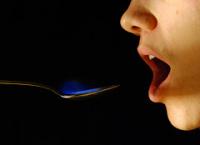Kitchen Spoons Inaccurate Dosing Tools
- Metric Tags:
When it comes to dosages of cold medicine, your kitchen spoons may not be measuring up. Using spoons to measure medicine may be causing you to under or overdose, according to new research in the Annals of Internal Medicine.
“Spoon dosing has been identified as 1 of the 3 major causes of dosing errors and pediatric poisonings,” authors of the study wrote. “Most persons still use spoons when pouring medicine for themselves and their families.”
Nearly 200 university students were asked to measure what they perceived to be equal amounts of cold medicine into three different spoons—a standard teaspoon, a medium-sized spoon, and a larger spoon.
“We first gave them a full bottle of cold medicine and a teaspoon and asked them to pour exactly 1 teaspoon (5 mL),” authors of the study explain. “Next, we asked participants to pour the same 5-mL dose into each of the remaining 2 spoons in a randomized order.”
Standard dosage for most cold medicines is usually between 2 teaspoons and 2 tablespoons. Although most participants were confident that they’d measured accurately, they measured 8.4 percent (.42 mL) too little when using the medium-sized spoon, and 11.6 percent (.58 mL) too much when using the large spoon.
Although that may not seem like much for per dose, a little change in medicine can make a lot of difference. According to study leader Dr. Brian Wansink of the Cornell Food and Brand Lab, this can add up to the point of ineffectiveness or even danger.
They also point out that this could reach farther than the kitchen at home. Even the most practiced nurse or Dr. Mom could be measuring incorrectly when using spoons because the size of the spoon makes the same amount appear differently.
“Simply put, we cannot always trust our ability to estimate amounts," co–author, Dr. Koert van Ittersum, Assistant Professor of Marketing at Georgia Tech, said in a press release. "In some cases it may not be important, but when it comes to the health of you or your child, it is vital to make an accurate measurement."
If the recommended dose on a bottle of allergy medicine is a teaspoon or tablespoon, lots of us reach in the kitchen drawer.
But kitchen spoons are notoriously inaccurate. "They can be way off," says physician Darren DeWalt of the University of North Carolina. Some kitchen teaspoons are twice as big as others, says DeWalt.
Even if you mean well, it's very easy to make a mistake. In theory, the little plastic "dosing" cups or droppers that come with medicine bottles should improve accuracy. But a study just published online by JAMA finds 98 percent of the top-selling 200 over-the-counter children's medications sold in 2009 came with confusing inconsistencies in dosing instructions.
A common mix-up: The instructions on the bottle give teaspoon measurements, but the dosing cup marks milliliters, or ml. And who remembers this conversion?
The Food and Drug Administration has issued draft guidelines aimed at making the instructions on over-the-counter medicines less confusing.
Many experts — including the lead author of the new research — say adopting one unit of measurement would be the best way to go. "If we could have milliliters be the only unit of measurement used, then I think this may be the best system," says researcher H. Shonna Yin of New York University School of Medicine.
The industry group that represents makers of over-the-counter kids' medications, the Consumer Healthcare Products Association, says they've already made some progress in improving dosing instructions for parents.
They're moving closer to adopting consistent units of measurement, so that the directions on the bottle match the markings on the dosing device.
"It will take between now and next year to fully implement the guidelines," says CHPA's Barbara Kochanowski. So far, the group hasn't committed to a milliliter-only system.
These changes may seem small, but UNC's DeWalt, who wrote an accompanying editorial for JAMA, argues that they're important. He says deaths from overdoses of over-the-counter medicines are fairly rare. But think about potent allergy medicines. "If I was to give my child too much Benadryl, it would pretty much knock them out," DeWalt says.
DeWalt argues that pharmaceutical companies spend hundreds of millions of dollars bringing products to market, but they don't spend very much money explaining to parents how to give this medicine to kids.
"I think a little more attention to this could provide a safer environment," he says. And maybe help parents — and kids — sleep a little easier.
Download NPR audio mp3
source:
http://www.npr.org/blogs/health/2010/11/30/131701589/why-it-s-so-easy-to...
http://blog.healia.com/00425/kitchen-spoons-inaccurate-dosing-tools
